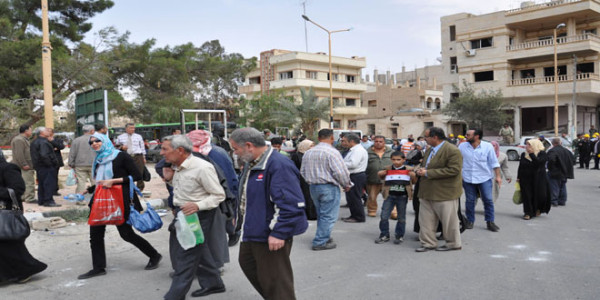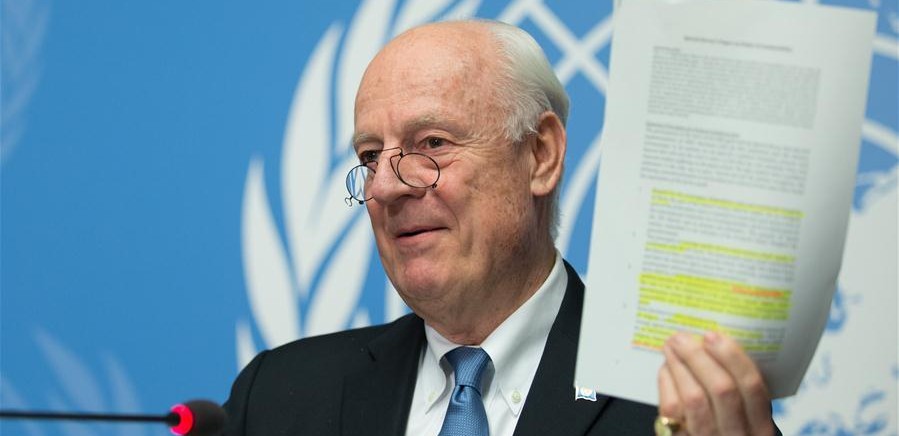PHOTO: UN envoy Staffan de Mistura with his document of “communalities” in political talks, March 24, 2016
LATEST
- Russia Lies About North Aleppo Battles, Converts All Rebels into “Jabhat al-Nusra”
- Free Syrian Army Claims Victory v. ISIS on Damascus-Baghdad Highway
- State Media Tries to Counter Story of “Destroyed Palmyra”
- Medecins Sans Frontieres: “Catalogue of Horror in Besieged Areas”
- Rebels Continue Advance Against ISIS Groups in Southwest
- Video: Capturing Border Crossing with Turkey, Rebels Face ISIS Suicide Attack
- Jaish al-Islam to Try Commander Over Firing of Mortars and Rockets on Aleppo Civilians
UN envoy Staffan de Mistura has delayed the resumption of political talks on Syria’s crisis so he can meet officials in Damascus and Iran.
De Mistura pushed back the date for the Geneva negotiations by two days to April 13, saying, “The next round of the talks needs to be quite concrete in the direction of a political process leading to a real beginning of a political transition.”
In an interview with Russia media two weeks ago, President Assad rejected a “transitional governing authority”, which has been the centerpiece of international discussions since 2012.
Assad said there could be a “national government” of the opposition, independent, and regime figures. However, he did not indicate that he would step aside and he rejected the leading opposition-rebel bloc as “terrorist”.
See Syria Daily, March 31: Assad Rejects Transitional Government
The opposition-rebel High Negotiations Committee has maintained the demand that the President leave power.
The previous round of talks ended on March 24 with de Mistura circulating a document setting out “commonalities” of a resolution. However, the Assad regime has refused to move beyond its text — described as “bland” and “vague” by officials and diplomats — and the opposition-rebel HNC has said that the envoy’s text is not satisfactory. Meanwhile, Russia has insisted that the talks be expanded to include the Syrian Kurdish Democratic Union Party (PYD) and politicians close to Moscow.
The PYD’s representative in Moscow, Rodi Osman, said on Friday:
We think that these should not be two-way negotiations — between the official Damascus and the opposition group set up in Riyadh. The representatives of all the ethnic groups living in Syria should take part in the talks.
They should discuss the creation of a social and political union so that the rights of no ethnic group are violated.
UN “Disappointed and Disheartened” Over Regime and Aid
De Mistura said yesterday that the regime delegation will not arrive in Geneva until April 14 or 15 because of Parliamentary elections on April 13. In addition to the discussions in Syria and Iran, the envoy said he had heard “some interesting ideas” from Russia and would consult Turkish, Saudi, Jordanian and Lebanese officials.
Meanwhile, Jan Egeland, who advises de Mistura on humanitarian issues, said he was “disappointed and disheartened” at the Assad regime’s continued barriers to access to humanitarian aid:
April was supposed to be our best month. It’s not looking so, so far. We had five convoys ready to go, the last four days. All of the five convoys could not go. 287,000 people therefore did not get the relief, in hard-to-reach areas or in besieged areas.
UN aid chief Stephen O’Brien said last week that aid agencies still cannot reach six of 18 areas besieged by the Syrian military.
Reports from Darayya, southwest of Damascus, indicate that residents have been forced to eat leaves to survive. Almost 50 women from the town have posted an international appeal asking for assistance before there are deaths from starvation.
See Syria Feature: Appeal by Women of Besieged Darayya — “There is No Food”
Russia Lies About North Aleppo Battles, Converts All Rebels into “Jabhat al-Nusra”
Offering a vivid illustration of its propaganda approach, Russia’s Defense Ministry converted all rebel factions into the jihadists of Jabhat al-Nusra on Thursday.
The Ministry proclaimed that Nusra is occupying areas north of Aleppo city:
According to reports from local residents coming to the [Russian] reconciliation center, more than 1,000 militants of the terrorist group Jabhat al-Nusra, armed with 7 tanks and 24 all-terrain vehicles with heavy machine guns, are concentrated in the localities of Muheimhandrat, Jandul, Hraitan, and Qafr-Hamra,
However, Jabhat al-Nusra withdrew from the northern Aleppo front last August, redeploying in Idlib Province amid discussion of a “safe zone” along the Turkish border.
Local sources reconfirmed on Friday that Jabhat al-Nusra is involved in the fighting on the front south of Aleppo, accompanying rebels in an offensive that regained territory last week, but that Nusra has not moved back to the battlefield north of the city. Nor, again contrary to Russian statements, is Nusra involved in the rebel fighting with the Kurdish militia YPG in the Sheikh Maqsoud district of Aleppo city.
Instead, information on the northern Aleppo battles is coming from Free Syrian Army outlets. The clashes are mainly in the Handarat industrial zone, with the FSA claiming that it has repelled the ground assault supported by Russian bombing.
Justifying its military intervention, Russia has repeatedly put out false “news” about its operations since last September. Moscow initially said that all attacks were on the Islamic State, but more than 80% of the airstrikes were on opposition-held territory.
Free Syrian Army Claims Victory v. ISIS on Damascus-Baghdad Highway
The Free Syrian Army is claiming victories against the Islamic State on the Damascus-Baghdad highway, northeast of the capital near the town of Dumayr.
The Revolutionary Forces of Syria Media Office said FSA factions and other rebel brigades repelled ISIS attacks on positions in the Eastern Qalamoun area, inflicting casualties and destroying vehicles.
A rebel commander, Brigadier Bakkour Salim, said regime forces had surrendered several locations to ISIS on the highway just before the attack.
State Media Tries to Counter Story of “Destroyed Palmyra”
Syrian State media has tried to counter reports in international media that much of Palmyra, the Roman-era city recaptured from the Islamic State in late March, has been destroyed and that the Syrian military has prevented residents from returning.
While damage to the Roman architecture and antiquities was less than feared, areas in “new Palmyra” were devastated. The Assad regime claims that the Islamic State caused the damage, but reporters said evidence also pointed to the effects of Russian and regime bombardment.
The New York Times photojournalist Bryan Denton also wrote, “Syrian soldiers and allied militiamen said that if residents were allowed to return to the city, Islamic State fighters might come back with them, and attempt to re-establish their presence.”
State news agency SANA headlines, “Palmyra Locals Start Returning Home, Services Are Being Restored Gradually”: “Tens of families have started to return to their houses in Palmyra city, expressing confidence that the Syrian army will absolutely triumph over terrorism.”

Medecins Sans Frontieres: “Catalogue of Horror in Besieged Areas”
The international medical organization Medecins Sans Frontieres has issued a statement setting out the “catalogue of horror…virtually unabated in many besieged areas” despite a February 27 cessation of hostilities.
MSF, which runs medical facilities across Syria, cites the regime bombing that killed 38 people and wounded 87 near Damascus last week. It notes that the bombed area included field hospitals, a nearby school, and inhabited buildings and that five medical staff were injured.
MSF also describes the killing of the last doctor in Zabadani in Damascus Province by a regime sniper; the removal of medical items from aid convoys; the denial of medical evacuations, leading to deaths; and continued malnutrition as the Assad regime refuses access to besieged towns.
Rebels Continue Advance Against ISIS Groups in Southwest
Rebels have gained more territory from Islamic State-linked groups in southwest Syria.
Reports on Friday indicate that rebel factions, including the Free Syrian Army and Ahrar al-Sham, have moved into Tasil. The town is one of the largest near the Golan Heights and the demilitarized zone with Israel.
Last month Liwa Shuhada al-Yarmouk and Harakat al-Muthanna, both supporters of ISIS, tried to break out of their pocket of territory in western Daraa Province. However, their initial gains have been reversed in the past week, with rebels taking a series of villages and advancing on Tasil.
Video: Capturing Border Crossing with Turkey, Rebels Face ISIS Suicide Attack
Amid their capture of the al-Rai border crossing with Turkey and nearby village, rebels face a suicide vehicle bomb from the Islamic State:
The driver of the vehicle was the only casualty, and rebels suffered no damage to equipment.
Rebels moved into the border crossing on Thursday, continuing an eastward advance against ISIS in northern Aleppo Province (see earlier entry).
Jaish al-Islam to Try Commander Over Firing of Mortars and rocketss on Aleppo Civilians
The rebel faction Jaish al-Islam has announced that it will try a commander in military court for “violating orders and using unauthorized weapons” in Sheikh Maqsoud in Aleppo city.
Kurdish outlets said that 18 civilians were killed by shelling on Tuesday amid clashes between the Kurdish militia YPG and rebels.
See Syria Daily, April 6: Fighting Escalates Between Kurdish Militia and Rebels in Aleppo
Jaish al-Islam officials said the commander used mortars and Grad rockets, which are not authorized in urban fighting if civilians are in the combat zone.
Pro-Assad activists and Russia State outlet RT are pushing the story that “chemical weapons” were used, claiming that “gas used in the attack caused choking and illness among those affected”. The support for the claim comes from a “local journalist”, a doctor named as Wallat Mamu, and pictures of patients taking oxygen.
The Kurdish YPG asserted, “We confirm the information concerning usage by Islamists, acting under patronage of Turkey, of the poisonous agent in the Maqsood neighborhood of Aleppo. Its poisonous effect have experienced dozens of civilians.”
However, Jaish al-Islam spokesman Captain Islam Alloush reiterated, “The circulated news is a…misinterpretation of [our] latest statement….The weapons used [were] not internationally banned.”

